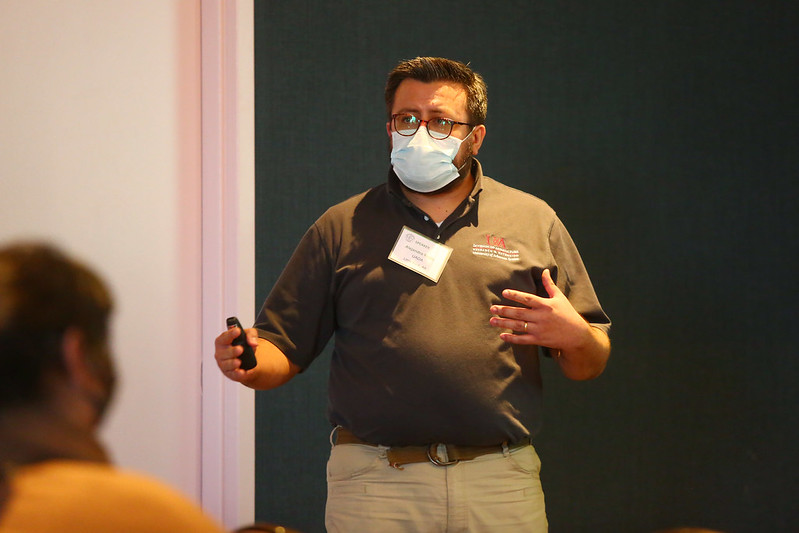Feb. 25, 2022
Arkansas researchers lead fight against pathogens in greenhouses, hydroponics
By Ryan McGeeney
U of A System Division of Agriculture
Fast Facts:
- Hydroponic systems have been in use since 1930s
- Pathogens can still thrive if production isn’t monitored
(711 words)
FAYETTEVILLE, Ark. — Even in the most controlled of environments, some things are
just going to be out of growers’ control. Researchers at the Arkansas Agricultural
Experiment Station are working to understand those variables, including soilborne
pathogens and other disease factors that attack plants, to give farmers, horticulturists
and others the best possible advantage.
Alejandro Rojas, assistant professor of soilborne pathology and ecology for the Experiment Station, the research arm of the University of Arkansas System Division of Agriculture, recently presented aspects of the latest research into plant pathogens and disease management within greenhouses and hydroponic systems at the 40th annual Oklahoma & Arkansas Horticulture Industries Show, held in Fayetteville, Arkansas.
“We are trying to understand and develop management recommendations in hydroponics for production of leafy greens,” Rojas said. “The session was focused on controlled environments, and there are a good number of growers in the region using this system to produce mainly leafy greens, but diseases and their management is one of the concerns that will always exist.”
Rojas said the key to success in these managed systems is “to act preventively instead of reactively, so we try to be ahead of potential disease issues that could affect their production.”
Various hydroponic production systems have been in use since the 1930s. The systems tend to increase yield, reduce weed competition and reduce the chance for contamination. However, Rojas said, wherever a host, a conducive environment and a pathogen come together, disease will occur.
“The appearance of disease is often related to some stress or condition that is favoring a pathogen to propagate, and as I say often, disease is the ultimate consequence of a certain condition that caused stress on the plants,” Rojas said.
During his presentation, Rojas recommended growers make use of plant diagnostic laboratories in their respective areas. In Arkansas, the Division of Agriculture offers multiple services, including the Water Quality Laboratory, the Plant Health Clinic, the Soil and Plant Testing Laboratory and more. Find a full list of the diagnostic and testing services offered by the Division of Agriculture.
Rojas said that making use of the available diagnostic resources was the best way for growers of all levels, from hobbyists to commercial producers, to manage pests, pathogens and problems.
“The first question that we get is ‘what is killing my plants?’ The second is ‘how could I manage the disease?’ For that reason, I introduced the importance of submitting proper samples to the Plant Health Clinic,” Rojas said. “In that way, like a doctor, if we know what is causing the disease, we could do the appropriate recommendations.”
Rojas said that many, but not all, of the problems encountered in hydroponic systems are caused by water molds, such as Pythium and Phytophthora.
“They are by far some of the most important issues,” he said. “Nonetheless, they are not the only ones. Some fungi like Fusarium are also frequent in hydroponic systems.”
Overall, Rojas advises hydroponic and greenhouse growers to approach pest management like a wellness program, rather than relying on the emergency room. The approach involves first identifying potential sources of diseases and other hazards, including new plants and seeds, used containers and contaminated materials, soil, water or other media. Other management practices include buying plants or seeds from certified sources, inspecting new material coming into a given production system and being willing to reject deliveries containing infected plant material.
Rojas said his research, which is being conducted in concert with Experiment Station researchers Ryan Dickson, assistant professor of horticulture, and Kristen Gibson, associate professor of food science, will continue to pursue and understanding of “how regulating nutrient solutions could help to reduce the impact and manage plant pathogens in hydroponics systems.
Rojas, Dickson and Gibson received a Critical Agricultural Research and Extension grant from the U.S. Department of Agriculture’s National Institute of Food and Agriculture to support the project.
“We expect to develop a set of recommendations that could help regional and national growers,” Rojas said. “In addition, in a recent proposal, we are focusing on having a better understanding of those critical points in production systems and the extent of potential pathogens. By identifying those critical points, we hope to educate growers on how to better approach these areas to improve production.”
To learn more about Division of Agriculture research, visit the Arkansas Agricultural Experiment Station website: https://aaes.uada.edu/. To learn about extension programs in Arkansas, contact your local Cooperative Extension Service agent or visit www.uaex.uada.edu. Follow us on Twitter and Instagram at @AR_Extension. Follow on Twitter at @ArkAgResearch. To learn more about the Division of Agriculture, visit https://uada.edu/. Follow us on Twitter at @AgInArk.
About the Division of Agriculture
The University of Arkansas System Division of Agriculture’s mission is to strengthen agriculture, communities, and families by connecting trusted research to the adoption of best practices. Through the Agricultural Experiment Station and the Cooperative Extension Service, the Division of Agriculture conducts research and extension work within the nation’s historic land grant education system.
The Division of Agriculture is one of 20 entities within the University of Arkansas System. It has offices in all 75 counties in Arkansas and faculty on five system campuses.
Pursuant to 7 CFR § 15.3, the University of Arkansas System Division of Agriculture offers all its Extension and Research programs and services (including employment) without regard to race, color, sex, national origin, religion, age, disability, marital or veteran status, genetic information, sexual preference, pregnancy or any other legally protected status, and is an equal opportunity institution.
# # #
Media contact:
Ryan McGeeney
Communications Services
University of Arkansas System Division of Agriculture
Cooperative Extension Service
(501) 671-2120
rmcgeeney@uada.edu
